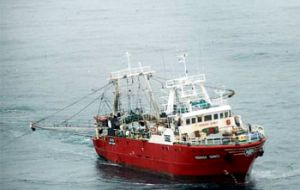MercoPress. South Atlantic News Agency
Shrimp vessels to be ordered to use selectivity devices
 Shrimp vessels will have to use special selectivity kits that limit the catch of juvenile hake
Shrimp vessels will have to use special selectivity kits that limit the catch of juvenile hake The subsecretary of Argentine Fisheries and Aquaculture, Norberto Yauhar, is planning to urgently implement measures to conserve the population of hake (Merluccius hubbsi) juveniles in the north Patagonian breeding ground.
To this end, he will send a note to the Federal Fisheries Council (CFP) to petition the pertinent actions that assure the sustainability of the juvenile resource.
On the basis of a report authored by the National Institute for Fisheries Research and Development (INIDEP) – Distribution and structure of the hake population in the of north Patagonian breeding area during the month of January, period 2005 - 2010 – and on the results of the two first days of the Selectivity Workshop, Yauhar considers it necessary to adopt effective conservation measures so that ”assumptions and expectations that led to the establishment of the last maximum catch quota (CMP) can be fulfilled.
The studies carried out last January revealed that the populations of age 0, 1 and 2 were very reduced in relation to that observed in 2009.
”The most reliable findings in this sense are those that correspond to age 2, as it is possible that the winter campaign (hake global) allows [us] to rectify or ratify the findings on the two younger populations (0 and 1),” the Secretary of Fisheries and Aquaculture indicated.
Some of the measures proposed by Yauhar to the CFP are to:
• Demand all shrimp vessels operate with a selectivity device (Disela or Hargril), in view of the fact that the discardings reported for this fishery are incompatible with the aim of recovery of the regulation in effect. In addition, they should possess good coverage in the form of INIDEP observers board, so they can report the incidence of hake catch percentages in fishing hauls in real time. A maximum percentage should also be established that, once reached, forces vessels to leave the fishing zone.
• Halt all fishing targeting hake in San Jorge gulf, as a result of the high incidence of juveniles in the region, as revealed by the findings presented by the INIDEP in all the surveys over the last 15 years. Should the measures not be adopted, like the closing of this fishery in the waters of the Gulf – assimilating the situation to that of the standing ban area for trawl fishing within national jurisdiction or its strong limitation, combining areas of strict bans with the establishment of an area of restricted effort limited to the operation of ships of smaller bearing that cannot accede to waters of national jurisdiction – it will be impossible to prevent the catch of juvenile units and the consequent discarding;
• Restore the use of the DEJUPA device to the entire fleet, given that the proposals presented by the sector did not constitute an effective alternative.
Similarly, Yauhar agreed with the deputy head of the Argentine Naval Prefecture (PNA), Julio Cingolani, per the implementation of strict controls of the regulations in force in the area of San Jorge gulf.
The fleet will be ordered to operate in the area where the authorised selectivity device’s use is obligatory.
The CFP has fixed the maximum allowable catch (CMP) of hake at 338,000 tonnes for this year. This level surpasses last year’s maximum catch by 72,000 tonnes, or 27 per cent.
The latest statistics released by the Fisheries Subsecretariat indicate that 52,136.1 tonnes of hake were landed between 1 January and 7 April in Argentine ports. This figure reflects a loss of 17.6 per cent with respect to the first quarter of 2009, when 61,885.8 tonnes were unloaded. (FIS)




Top Comments
Disclaimer & comment rulesCommenting for this story is now closed.
If you have a Facebook account, become a fan and comment on our Facebook Page!